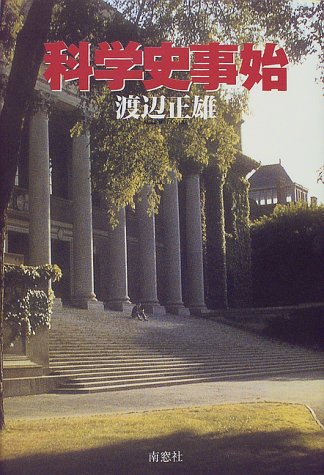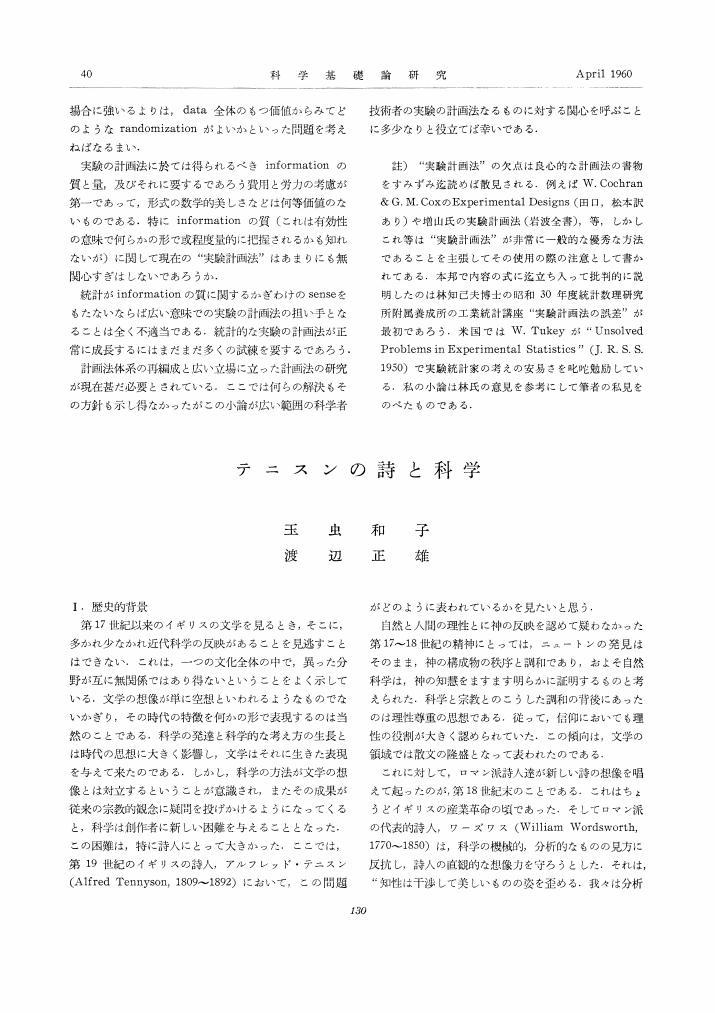4 0 0 0 OA 明治初期の日本における米国科学の影響
- 著者
- 渡辺 正雄
- 出版者
- 東京女子大学
- 雑誌
- 東京女子大學附屬比較文化研究所紀要 (ISSN:05638186)
- 巻号頁・発行日
- vol.14, pp.47-66, 1962-11
3 0 0 0 OA ミルトンと『失樂園』の科学史的背景
- 著者
- 渡辺 正雄
- 出版者
- 東京女子大学
- 雑誌
- 東京女子大學論集 (ISSN:04934350)
- 巻号頁・発行日
- vol.11, no.1, pp.33-52, 1960-10-30
The effect of the so-called "Scientific Revolution", especially that of the "New Astronomy", is very much evident in John Milton's later poems, particularly Paradise Lost. Milton not only lived at the time of Boyle, Hooke and Newton, but also shared the intellectual attitude of the Cambridge Platonists and the Protestant scientists, who refused to accept traditional scholastic authority, exalted "Reason" as the godlike principle in man, and highly valued the study of nature as "the Book of God". As the modern scientific consciousness rejected scholasticism, so the Protestant consciousness of Milton dismissed fictions, fables and mythologies. There still remained for him, however, one source from which he could draw images which were not only poetic but also true: the Bible. Shakespeare, seemingly content with the medieval view of nature, was quite indifferent to the new astronomy. Milton, however, was very much aware of it. Frequent references are made in his Paradise Lost to Galileo's telescope and to the new astronomical wonders manifested by it. These are the sun-spots, the satellites of the planet Jupiter, the phases of the planet Venus, the similarity of the surface of the moon to that of the earth, the Milky Way "powdered with stars", and many fixed stars almost infinitely distant from the earth; all of which powerfully evidenced the Copernican theory. There are also mentioned, besides the mobility of the earth and its similarity to the planets, some conspicuously Galilean and Keplerian speculation that there might exist "other Suns with attendant Moons" and other inhabited worlds. Before he lost his sight, Milton must have surveyed the sky through a telescope on some occasion if not necessarily on his youthful visit to "the famous Galileo grown old, a prisoner to the Inquisition". To this actual sense experience of celestial observation, it seems, he mostly owed the sense of a boundless universe which gave Paradise Lost its unique character as "the first modern cosmic poem" wherein a drama is played out against a background of interstellar space. It is also very likely that Milton was acquainted with the scientific writings of Galileo, Kepler and perhaps of Gilbert. The first one third part of the Book VIII of Paradise Lost is devoted to the discussion on astronomical systems. Adam asks the Angel Raphael whether the earth or the sun is the centre of the world. It is manifest in Raphael's answer that Milton was well aware of the absurdity of the Ptolemaic system and of the beautiful simplicity of the Copernican theory. Yet Milton's Raphael does not give any definite conclusion as to the world systems, but urges Adam to be humble and obedient to God above, saying that though the earth may be so small compared with the firmament, it is given the honour of being waited upon by the host of the heavenly bodies only because of its noble inhabitant, man. Elsewhere, Milton also makes use of the geocentric world picture and traditional view of nature as well as the new. Milton's ultimate concern did not consist in matters of science but in the theocentric humanism, although he frequently took similes and metaphors from science. His conviction of man's moral responsibility outweighed everything else. From this point of view, as is suggested in Raphael's answer, unlimited desire for knowledge of secrets of nature and of God might lead man's mind to the dangers of pride and of disobedience to God. Hence, man must be well controlled by "Reason", which was counted, by Milton as well as by he Cambridge Platonists, as the guiding principle bestowed on man. Whether or not man's free will chooses obedience to God according to reason, is the central theme of Milton's Paradise Lost, and this theme is embodied in the choice of Eve and Adam as to whether they should eat the fruit of the forbidden tree. Twenty years after this drama "Of Man's first disobedience" was published, there appeared Newton's Principia. The modern mind then became more occupied by "Newton's apple" than by "Eve's", and scientific rationalism helped to nourish the spirit of satire in the sphere of literature-which spirit, it will be remembered, was also to make attacks on science itself and on the enthusiasms of the Royal Society, as in the case of Jonathan Swift and other satirists.
2 0 0 0 OA テニスンの詩と科学
1 0 0 0 OA 1989 大阪 年会シンポジウム:科学史教育の現状と展望
1 0 0 0 OA 「科学史」教育について(アゴラ)
- 著者
- 渡辺 正雄
- 出版者
- 日本科学史学会
- 雑誌
- 科学史研究 (ISSN:21887535)
- 巻号頁・発行日
- vol.28, no.171, pp.173-177, 1989 (Released:2021-09-01)
- 被引用文献数
- 1
1 0 0 0 OA 第17回国際科学史会議に出席して
- 著者
- 渡辺 正雄
- 出版者
- 日本科学史学会
- 雑誌
- 科学史研究 (ISSN:21887535)
- 巻号頁・発行日
- vol.24, no.155, pp.191, 1985 (Released:2021-04-07)
1 0 0 0 OA ニュートンの"瞬間"-『プリンキピア』と『光学』を中心に-
- 著者
- 渡辺 正雄
- 出版者
- 日本科学史学会
- 雑誌
- 科学史研究 (ISSN:21887535)
- 巻号頁・発行日
- vol.24, no.154, pp.114-119, 1985 (Released:2021-04-07)
1 0 0 0 OA 地球中心体系と太陽中心体系との対応関係について
- 著者
- 渡辺 正雄
- 出版者
- 日本科学史学会
- 雑誌
- 科学史研究 (ISSN:21887535)
- 巻号頁・発行日
- vol.24, no.153, pp.18-24, 1985 (Released:2021-04-07)
1 0 0 0 OA アゴラ ガリレオの盗作(?)
- 著者
- 渡辺 正雄
- 出版者
- 日本科学史学会
- 雑誌
- 科学史研究 (ISSN:21887535)
- 巻号頁・発行日
- vol.23, no.151, pp.192, 1984 (Released:2021-04-08)
1 0 0 0 OA S.L.メトカーフ『カロリック』の改訂版とそのAppendixについて
- 著者
- 渡辺 正雄
- 出版者
- 日本科学史学会
- 雑誌
- 科学史研究 (ISSN:21887535)
- 巻号頁・発行日
- vol.21, no.141, pp.46, 1982 (Released:2021-05-13)
1 0 0 0 OA 第14回国際科学史会議について
- 著者
- 渡辺 正雄
- 出版者
- 科学基礎論学会
- 雑誌
- 科学基礎論研究 (ISSN:00227668)
- 巻号頁・発行日
- vol.12, no.2, pp.79-80, 1975-03-25 (Released:2009-09-04)
1 0 0 0 OA 科学的近代化と伝統 (II) 欧米をめぐって
- 著者
- 渡辺 正雄
- 出版者
- 科学基礎論学会
- 雑誌
- 科学基礎論研究 (ISSN:00227668)
- 巻号頁・発行日
- vol.4, no.2, pp.82-85, 1959-09-30 (Released:2009-09-04)
1 0 0 0 OA 科学的近代化と伝統 -欧米をめぐって-
- 著者
- 渡辺 正雄
- 出版者
- 科学基礎論学会
- 雑誌
- 科学基礎論研究 (ISSN:00227668)
- 巻号頁・発行日
- vol.4, no.1, pp.38-41, 1958-12-25 (Released:2009-09-04)
1 0 0 0 OA ラムフォード伯と熱運動説
- 著者
- 渡辺 正雄
- 出版者
- 科学基礎論学会
- 雑誌
- 科学基礎論研究 (ISSN:00227668)
- 巻号頁・発行日
- vol.3, no.4, pp.540-546, 1957-12-25 (Released:2009-09-04)
- 参考文献数
- 19
1 0 0 0 ニュートンの質量概念 板倉聖宣氏の批判に答えて
- 著者
- 渡辺 正雄
- 出版者
- 日本科学史学会
- 雑誌
- 科学史研究 [第2期] (ISSN:00227692)
- 巻号頁・発行日
- no.84, pp.191-194, 1967-10
- 著者
- 渡辺 正雄
- 出版者
- 東京女子大学
- 雑誌
- 東京女子大学附属比較文化研究所紀要 (ISSN:05638186)
- 巻号頁・発行日
- no.8, pp.127-163,図巻末8p, 1959-10














